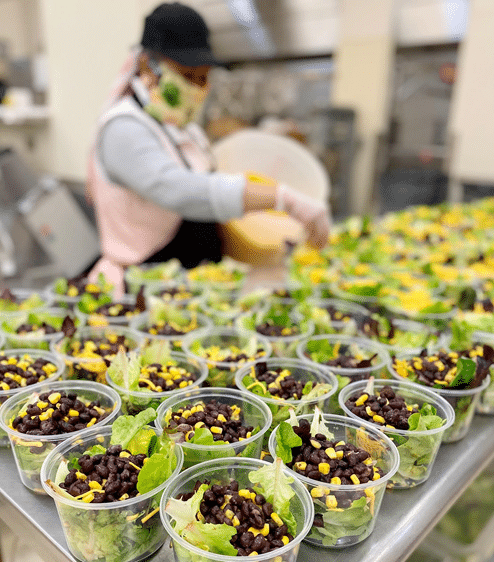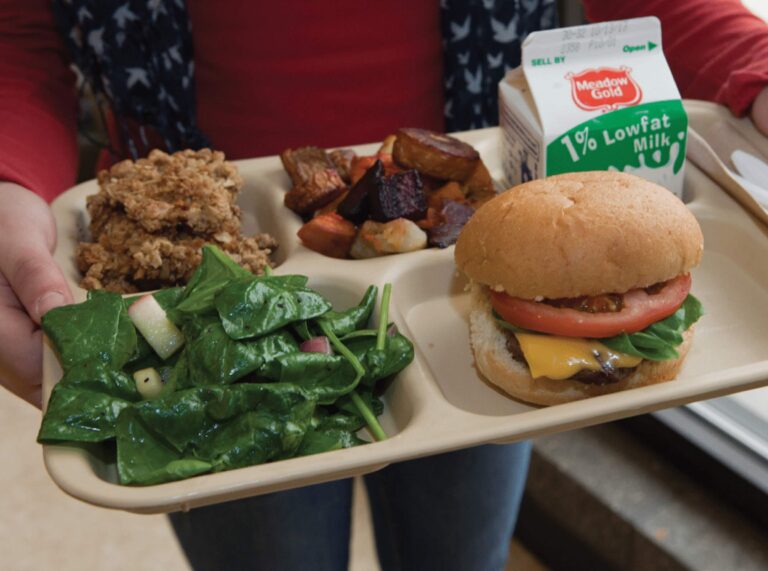State Policy Wins for Farm to School and School Meals: Your June/July Policy Brief
Several state-level wins highlight the key role that state policy can play in ensuring that kids have access to healthy, affordable, and local foods.
Join our corps! Applications for 2026-2027 are now open. Apply by March 30.
Several state-level wins highlight the key role that state policy can play in ensuring that kids have access to healthy, affordable, and local foods.

From California to Maine, state legislatures across the country have made impressive strides for school meals and farm to school. These state-level wins highlight the key role that state policy can play in ensuring that kids have access to healthy, affordable, and local foods. Let’s discuss some of these wins and highlight key policy movements at the federal level in the past month.
California
Following the advocacy of California coalition School Meals for All, California became the first state to pass free school meals for all legislation, guaranteeing that California’s school kids will permanently have access to free, nutritious school meals. “Congratulations, California, we just made history…ensuring that our 6.2 million students will have the educational readiness and nourishment they need to thrive,” said Kat Taylor, founder of TomKat Ranch Educational Foundation and co-sponsor of the Free School Meals For All Act of 2021.
Maine
Guaranteeing that students will have the nourishment they need to succeed, Maine also passed its own free school meals for all legislation. Ryan Parker, FoodCorps Maine Program Associate Director, wrote in the Portland Press Herald that “providing universal free school meals is cheaper [than the status quo], the right thing to do and good policy.” Thanks to Maine’s Full Plates Full Potential and other partners who made this win possible, Maine is setting an example for other states looking to make school meals accessible to all. Maine also expanded access to its local procurement fund ensuring those free school meals will contain more fresh products from Maine farms.
Oregon
On the farm to school front, Oregon remains a leader in its state-level support of farm to school programs. Through the continued advocacy of the Oregon Farm to School and School Garden Network and its members, the Oregon state legislature recently approved $10.2 million in funding for Oregon’s Farm to School Grant program, maintaining the current level of funding. With COVID-19 and wildfires injecting uncertainty into the state budget, maintaining current funding was an important win and represented Oregon’s recognition of the value of farm to school programs for Oregon kids, farmers, and communities.
Connecticut
The Connecticut biennial budget for fiscal year 2022-2023 includes $250,000 annually in American Rescue Plan Act funds for CT Grown for CT Kids Grants Program. The grants program will be informed by bill language crafted by CT Farm to School Collaborative and its partners. Commenting in support of the bill, Commissioner Bryan Hurlburt of the Connecticut Department of Agriculture wrote, “This program will help transform children’s understanding of our food system and will connect them to Connecticut’s local producers and farms.”
Watch this video on how our partners in Connecticut helped make this happen!
Michigan
Over in Michigan, $5 million was secured for 10 Cents a Meal for Michigan’s Kids & Farms, the state-run program that matches school purchases of Michigan-grown fruits and vegetables for up to ten cents per meal. This historic investment in the program, more than doubling the $2 million allocated for the program in 2020-2021, is a clear statement of the value of the program to the state and its communities. Thanks to the work of the Groundwork Center for Resilient Communities and its partners, 10 Cents a Meal continues to be a model for state-run farm to school programs across the country.
Massachusetts
With the recent introduction of free school meals for all legislation in its state legislature, Massachusetts has the potential to follow Maine and California’s leads and ensure that all children have access to the critical source of nutrition that school meals provide for students. Through the advocacy of the diverse Feed Kids Coalition, the aspirations of these advocates will hopefully soon be realized.
At the federal level, a lot has been happening, such as the House Education and Labor Subcommittee on Civil Rights and Humans Services hearing on priorities for child nutrition reauthorization.
Of special note, Reps. Stacey Plaskett, Jahana Hayes and Alma Adams recently introduced the Food and Nutrition Education in Schools Act of 2021 in the House of Representatives. As a companion to the bill introduced by Sens. Cory Booker and John Cornyn in the Senate, the bill establishes a USDA-led grant program for schools to hire full time nutrition educators to teach children about healthy, nutritious foods and set them up to make healthy choices for life.
Congress needs to hear from you now! Join us in raising your voice and urge your members of Congress to cosponsor legislation that supports healthy kids and healthy schools!

3 Reasons We Need School Meals for All

Mindful Tasting: Eating with All 5 Senses

Our 2025 Child Nutrition Policy Year in Review